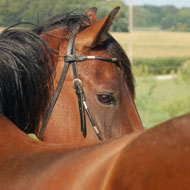
Vets worried horse owners may be receiving inaccurate information
The Australian Veterinary Association (AVA) are concerned about recent commentary on the safety of the Hendra vaccine, saying that it is not based on fact and that it may be misleading horse owners in high-risk areas
Dr Nathan Anthony, President of Equine Veterinarians Australia, said: “Horse owners are understandably concerned about reports of reactions to the vaccine, and vets understand this as they work with vaccines all the time.
“But we’re very worried about comments in social media critical of the Hendra vaccine’s safety. Horse owners in areas with a high risk of Hendra may be receiving inaccurate information and basing their decisions about whether to vaccinate on misleading data and this could be dangerous.
“The truth is that the Hendra vaccine does save lives. Some horses are experiencing temporary swelling and a stiff neck after a Hendra vaccination but the significance of this is no different to our sore arm after a tetanus vaccination and we should keep this in perspective.
“This is not a serious reaction. It’s relatively common and can be expected from any vaccination, and is a reasonable trade off to protect against very dangerous diseases."
Dr Brian Sheehan, an equine vet with over 30 years experience said that horse owners can be confident that the vaccine is safe.
“Our practice has administered more than 4,200 doses of the Hendra vaccine without any serious side effects" he said. “For every 500 doses that we administer we are seeing only one or two horses that develop swelling and a stiff neck however this is temporary and it completely resolves within days."
The Hendra Virus is now an endemic disease in Australia. The natural host is a large fruit bat called the flying fox and it is thought that horses may become infected through eating food contaminated by bat urine or birthing products. Human infections have occured as a result of direct exposure to body substances from infected or dead horses.
A vaccine was made available to horse owners in 2012. Initially it was released to high-risk areas and then to all horse owners soon after.
The AVA say that although the vaccine will significantly descrease the risk of exposure to the Hendra virus for horse owners, handlers and vets, precautions still need to be taken.



 The RCVS has announced a new version of its 1CPD mobile app, with enhanced features for veterinary surgeons and veterinary nurses to record their continuing professional development.
The RCVS has announced a new version of its 1CPD mobile app, with enhanced features for veterinary surgeons and veterinary nurses to record their continuing professional development.